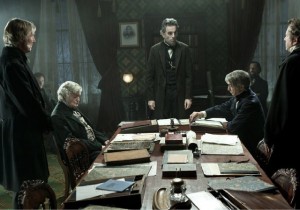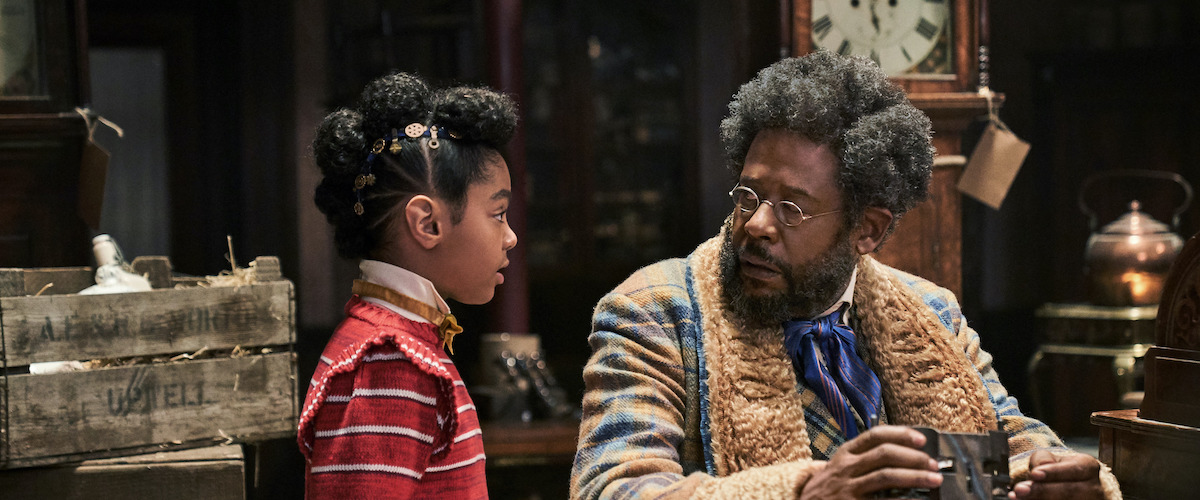Few people realize the Emancipation Proclamation didn’t represent the end-all of slavery in the United States. You would think the words: “shall be then, thence forward, and forever free“ would carry a weight of permanence, but noooooooo – it wasn’t in the constitution and, hence, wasn’t law. In short, the Proclamation was enforced as a matter of wartime expansion of presidential power, but could easily be overturned after the fact (Lincoln does some wonderful exposition on this point during the film). Abraham Lincoln still had to fight the legal battle to end slavery, once and for all, in the U.S. Constitution. Do you have any idea how difficult it is to amend the U.S. Constitution? Few people know that one, either. Let me put it this way — on average, it gets amended once every three-plus presidential terms. Current President Barack Obama has as much ability to amend the U.S. Constitution as a walrus has of growing wings.
In January of 1865, the end of the American Civil War was finally in sight. Four bloody years and 600,000 deaths had soured even the proudest of mantras. The South was willing, finally, to talk peace. Lincoln had to listen; he owed that to the American people. Problem is there still was a question of slavery and ending the war without solving the slavery issue is the equivalent of taking the present day USA, destroying every one and every thing in Texas and hitting the reset button. I would have said “California,” but I’m not entirely sure that would raise as much passion. Lincoln, the film, is essentially about the political battle to end slavery for good in the early days of 1865.
Having seen a really bad Lincoln impression this summer, I am currently skeptical of any donning the stove-pipe hat and Amish beard look. And here’s UK  Daniel Day trying to do that exact thing. Oh, this ain’t happenin’. How could he possibly know what Lincoln means to America? This is going to fail with the same zeal as Anthony Hopkins doing Nixon. Quick to critique, I didn’t like his voice and I didn’t like his walk. In retrospect, well, what do I know what the real Lincoln sounded and walked like? Almost everything I know about Lincoln mannerisms comes from commercials for President’s Day sales. And if I forgive that, Daniel Day-Lewis is exactly the man I imagine Abraham Lincoln to have been: stately and a bit gruff, shrewd and opportunistic, intelligent and calculating, yet kind and pensive. This is the Lincoln I picture when hear the Gettysburg Address. This is the Lincoln I picture when I think about secession.
Daniel Day trying to do that exact thing. Oh, this ain’t happenin’. How could he possibly know what Lincoln means to America? This is going to fail with the same zeal as Anthony Hopkins doing Nixon. Quick to critique, I didn’t like his voice and I didn’t like his walk. In retrospect, well, what do I know what the real Lincoln sounded and walked like? Almost everything I know about Lincoln mannerisms comes from commercials for President’s Day sales. And if I forgive that, Daniel Day-Lewis is exactly the man I imagine Abraham Lincoln to have been: stately and a bit gruff, shrewd and opportunistic, intelligent and calculating, yet kind and pensive. This is the Lincoln I picture when hear the Gettysburg Address. This is the Lincoln I picture when I think about secession.
Is it enough that Day fits the part perfectly? It’s hard to pin down the exact appeal of this film — do you dig rhetoric or watching men in wigs argue syntax? I think Steven Spielberg did us a favor in limiting the scope. This isn’t epic Lincoln of four+ grueling years of presidency; this isn’t the full Lincoln, just the steering column and a few fenders. That said, there’s no question of what Spielberg’s goal is — get his audience to sense who Abraham Lincoln was through the everyday battles he faced, both personal and public. To this effect, Spielberg succeeded with aplomb. Is it enough to entertain you for two-and-a-half hours? Was for me. The supporting cast is excellent as well, from Tommy Lee Jones as abolitionist representative Thaddeus Stevens, to Lee Pace as his main congressional opponent, to James Spader, the Manny Ramirez of acting, as a slimy vote-buying toadie.
You know what I’d love? I’d love to see Daniel Day-Lewis’ Lincoln as a vampire hunter. I want to see if that role tackled by a better actor yields a better result.
Despite his Gettysburg Addrez
Issues weighed heavy on The Prez
With critics galore
All shouting for more
Be easier to play “Simon Says”
Rated PG-13, 150 Minutes
D: Steven Spielberg
W: Tony Kushner
Genre: The minutiae of a legend
Type of person most likely to enjoy this film: Fans of political procedure
Type of person least likely to enjoy this film: Rebs, bigots



